Saltwater Fish You Dream About Owning (16 Most Expensive Saltwater Fish)
Originally posted on https://fishkeepingforever.com/saltwater-fish-you-dream-about-owning/ If you’re anything like me, you will have seen some amazing saltwater fish at your local pet or aquatic store and...Monday, August 26th 2019, 11:33 am
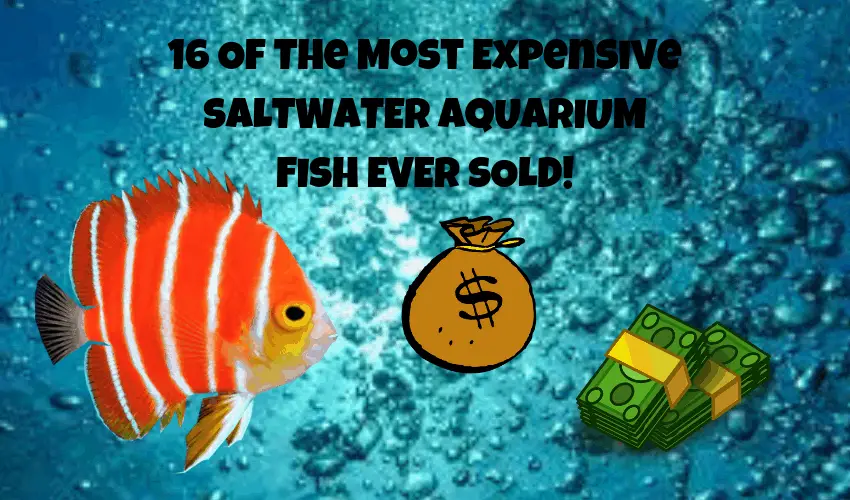
Originally posted on https://fishkeepingforever.com/saltwater-fish-you-dream-about-owning/
If you’re anything like me, you will have seen some amazing saltwater fish at your local pet or aquatic store and dreamed of owning one.
But, for one reason or another, you simply can’t buy one and they stay on your most wanted list for a little while longer.
Not only will you see some amazing fish in your local pet store, but you’ll most likely have seen some very rare saltwater fish on Youtube videos and websites just like this one. Many of these fish will be out of most people’s budget range and will always be on their bucket list of saltwater fish.
Many of these rare fish cost thousands of dollars to purchase and are owned by a very select few within the hobby.
The most expensive saltwater fish are:
- Peppermint Angelfish $30,000
- Masked Angelfish $15,000-$20,000
- PeaceKeeper Maroon Clownfish $8900
- Bladefin Basslet $8000+
- Australian Flathead Perch $7500-$8000
- Golden Basslet $7000-$8000
- Neptune Grouper $5000-$7000
- Wrought Iron Butterfly $3000
- Clarion Angelfish $2500-$3000
- Japanese Interruptus Angelfish $2000
- Candy Basslet $1000-$1500
- Crosshatch Triggerfish $1200-$1300
- Black Tangs $1000-$1200
- Gem Tang $800-$1000
- Arothron Puffer $700-$900
- Emperor Angelfish $600

What’s the most expensive saltwater fish ever sold?
The Peppermint Angelfish (Centropyge boylei), is a relatively small Angelfish that is known to be one of the most expensive saltwater fish ever captured and offered for sale.
This small but very beautiful Angelfish, lives in deep waters, between 60m -130m deep, which makes it very difficult to catch. This and the small numbers captured, makes them one of the rarest saltwater fish in the aquatic industry and therefore, out of reach for most aquarists with a price tag of $25,000-$30,000.
Why are some saltwater fish so expensive?
There are many reasons why some saltwater fish fetch huge sums of cash. Firstly, it is often the availability of the fish that sets its price. Like most things in life if it’s rare, it’s expensive.
Why are they rare? These fish may not be rare in the wild but they can be rare in the home aquarium because they are so difficult to catch in the wild. This can be due to their location and the depths that they live. If a fish lives in deep waters and hides in small caves, holes and amongst corals, they are going to be difficult to capture. Hence the price will be high!
Some fish have been scientifically bred to create new and striking species like Clownfish. Some species have been bred in captivity, under strict conditions to produce some unusual and amazing strains of an existing species. These rare fish are bred in small numbers to keep their rarity high for one purpose…. To keep the price high!
Are Expensive Fish Endangered Species?
Just because a fish is expensive it doesn’t mean that it’s endangered. As mentioned above some fish are plentiful in the wild but very difficult to capture – meaning it’s rare in the aquatic industry.
We would never endorse keeping endangered species in a home aquarium and to prevent this happening, there are strict import rules in place to protect our endangered species.
There will always be arguments for and against keeping rare fish in a home aquarium. Even large public aquariums have come under fire for collecting and displaying rare saltwater fish. The world famous Aquarium in Atlanta, Georgia came under fire for housing the biggest shark in the world recently. Even though the aquarium holds a staggering 10 Million Gallons!
16 Of The Most Desirable And Expensive Saltwater Fish
16. Emperor Angelfish $600
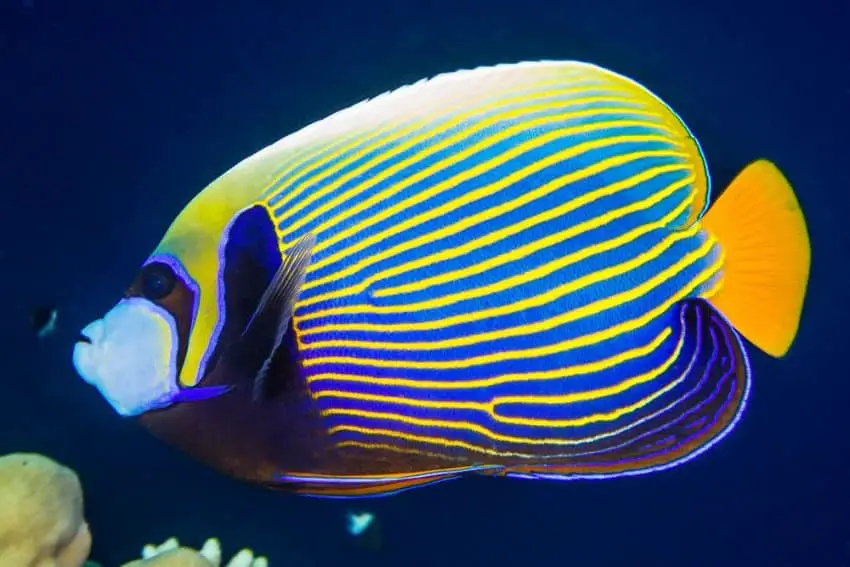 Adult Emperor Angelfish can reach an impressive 12-14” In a home aquarium
Adult Emperor Angelfish can reach an impressive 12-14” In a home aquarium
Emperor Angelfish (Pomacanthus Imperator) or Imperator Angelfish as it’s often called, has long been one of the most desirable saltwater fish available to the home aquarist. This species of fish dramatically changes appearance from juvenile to adult.
The two fish side by side are unrecognizable and make for a great longterm fish. You can watch them change appearance as they mature and turn into the truly amazing and striking fish they are.
Emperor Angelfish can grow from 2-3’ which is a perfect size to introduce them to your aquarium, to an impressive 12-14?. As with any fish that can grow to this size you, will need a large aquarium of no less than 230 Gallons.
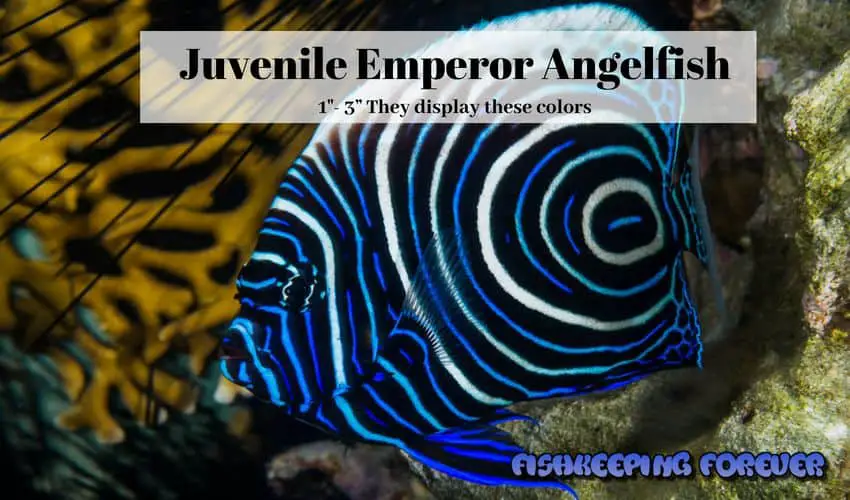 Juveniles look amazing!
Juveniles look amazing!
This natural reef fish will nip at stony and soft corals (sessile invertebrates), so care should be taken when introducing them into an established aquarium. They require plenty of rocks, caves and places to escape and retreat if they feel threatened.
The Emperor Angelfish has seen many changes in prices and I have seen them over the past 30 Years hit a high of $2000, but on average you can pick up one of these beauties for $600. Juveniles are cheaper and range from $200-$400.
15. Arothron Puffer $500-$800
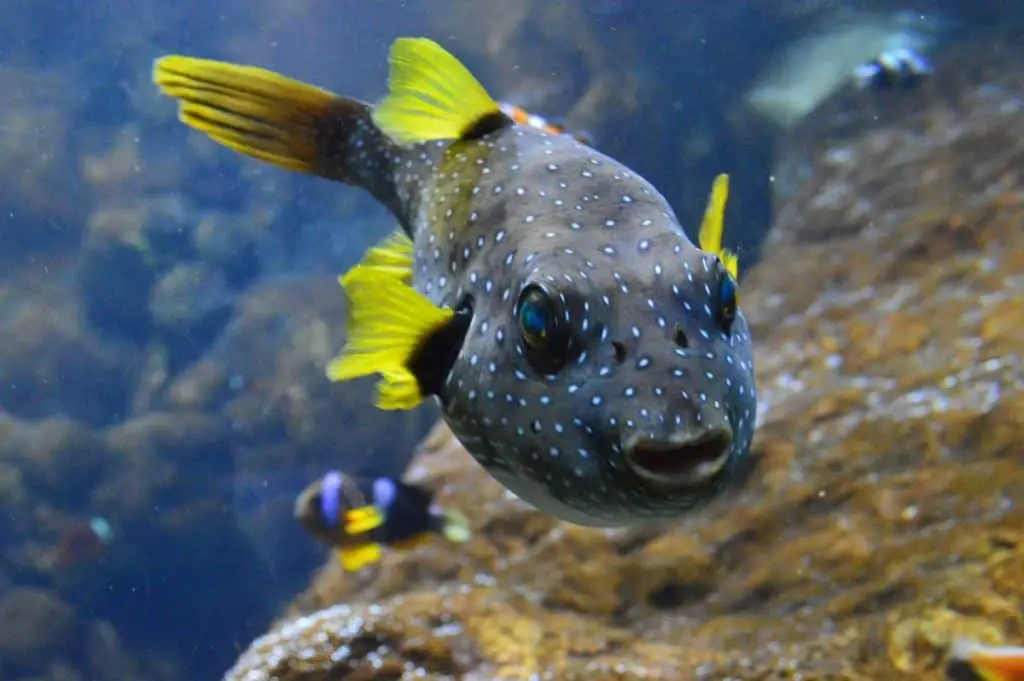
Arothron Puffer (Arothron meleagris) has many common names including Spotted Puffer, Guinea Fowl Puffer, and Golden Puffer. These saltwater fish have the ability to change appearance during different stages of their lives. They have three different color stages which they go through.
In the Black phase, they are dark blue to black with white spots over the entire body. The second phase is the mottled phase, in which the body has patches of yellow with a black and white speckled pattern. The third phase is the Golden phase, where the puffer is predominantly yellow. However, It rarely changes through all three phases while living in an aquarium.
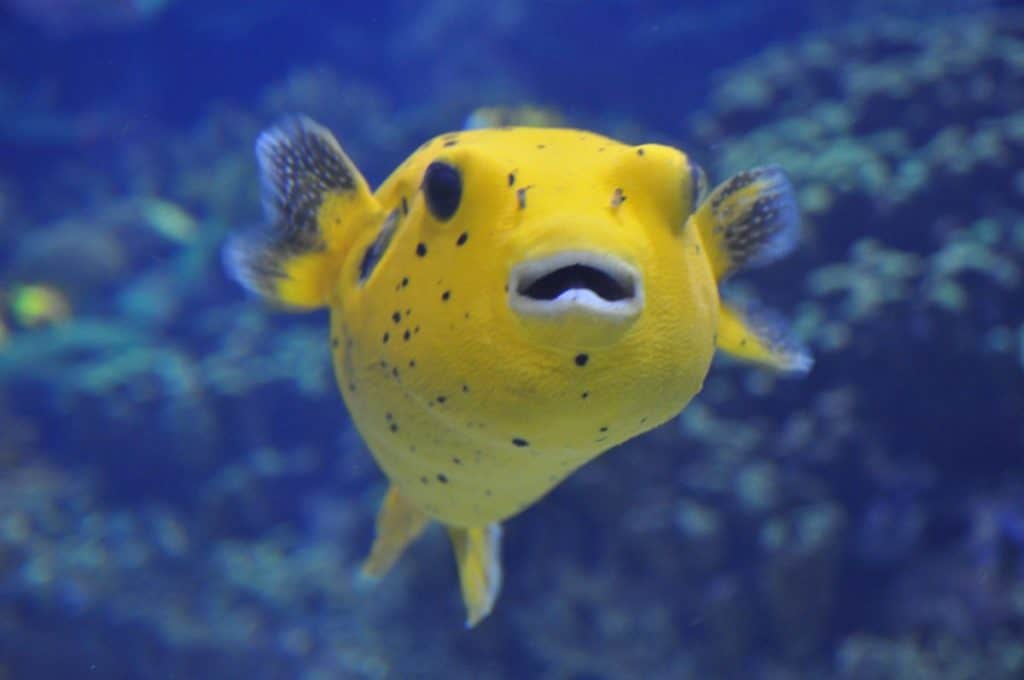 Image Credits @Wikimedia Commons
Image Credits @Wikimedia Commons
If you have never owned a puffer fish then you may not see the attraction. They are not the most striking fish on the market but they have by far the best personality (Okay, maybe some Gobies also have great personalities too). Puffer fish can do things no other fish can. To give you an idea, I had a porcupine puffer which was approximately 8?. I had him in an 8 foot open-topped aquarium. Whenever he was hungry, he would fill his body with air and water, then spit water out of the tank to get attention and remind us that it’s feeding time.
I have never seen any other fish display this sort of behavior and character in a home aquarium.
Arothron Puffers don’t have pelvic fins, they use their pectoral, dorsal, and anal fins to move around and for change of direction.
Another striking feature that you simply cannot miss is their fused beak-like structure which it uses to crush food, shells and small creatures. This, along with the fact that they can puff up their entire body to almost twice their relaxed size when feeling threatened, makes them a very sort after saltwater fish.
I have seen some huge specimens go for crazy prices but the average adult sells for approximately $800-$900 and juveniles for around $300. There are many different species of puffer fish and not all of them command such a high price. A lovely little 5-6? Porcupine puffer can cost as little as $50.
14. Gem Tang $800-$1000
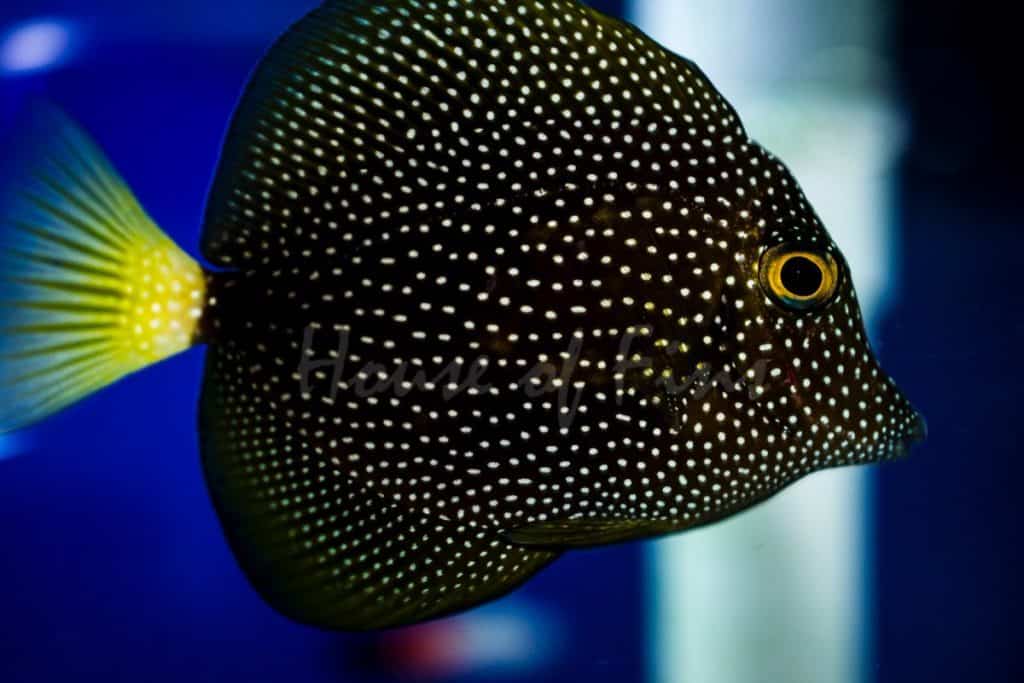
The Gem Tang (Zebrasoma gemmatum) is one of the most sort after Tangs available to the aquatic trade. This rare and spectacular saltwater tang is prized by many aquarists for its beauty and rareness.
The Gem Tang is famous for its bright white spots across its iridescently black body. Its yellow anal fin adds a striking contrast to the Gem Tang’s darker body.
This fish can be found in deeper waters in the Western Indian Ocean making collecting this species very difficult, hence their high price. They are not an endangered species – just simply hard to capture.
In the home aquarium, this species of Tang can be aggressive and a large aquarium with plenty of rocks and hiding places will be required. Their diet should consist of meaty foods with a good balance of vegetation and algae strips are a good way to help strengthen their immune system and reduce aggression, as well as improve their overall health in a home aquarium.
13. Black Tang $1000 – $1200
Originally posted on YouTube by Reef Builders
Great Video Footage Of the Awesome and Expensive Black Tang
The Black Tang or Acanthurus rostratus if you like to use scientific names, comes from the Central Pacific oceans and lives in lagoons and seaward reefs off a number of islands ranging from Papua New Guinea across to Hawaii. They prefer deeper waters at around 10-35m.
Living in deep waters and in such remote areas of the ocean make these fish incredibly difficult to capture and are rarely seen for sale to the public.
These fish don’t take well to their own species and will require a large, mature tank with plenty of vegetation and algae to feed upon. Your main issue to keeping one of these fish is diet. A balanced and suitable diet is key to their survival in a home aquarium.
12. Crosshatch Triggerfish $800 – $1300
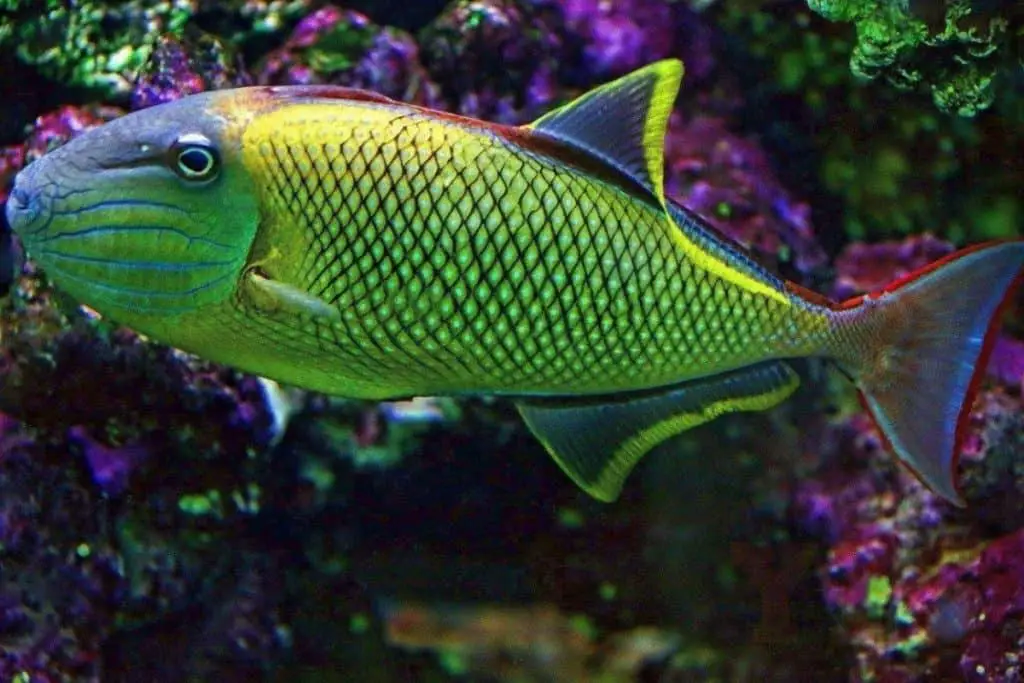 Crosshatch Triggerfish Male Adult Image Credits @Yourfishstore.com
Crosshatch Triggerfish Male Adult Image Credits @Yourfishstore.com
Crosshatch Triggerfish, also known as the Blue Cheekline Triggerfish, has one of the most striking color patterns of any saltwater fish and is one of the most prized triggerfish for all marine aquarists.
We have seen the prices of these fish drop in recent months and although show species still command $1200+, they can be found at around $700 for a small to medium fish.
These fish seem to travel well and adapt to life in a home aquarium with ease. However, most specimens come into the trade at around 4-5? which seems an attractive buy. You need to remember this fish will grow to around 12-13? quickly in the right environment and is not for the beginner.
An aquarium of at least 200 Gallons will be required for an adult fish.
The Crosshatch Triggerfish fish come from the Pacific ocean and live at depths of 6-130m making them rare in the aquatic trade. Most stores simply won’t order them without having pre-orders as they know most home aquarists don’t have aquariums suitable and big enough to house these fish.
11. Candy Basslet $1000-$1500
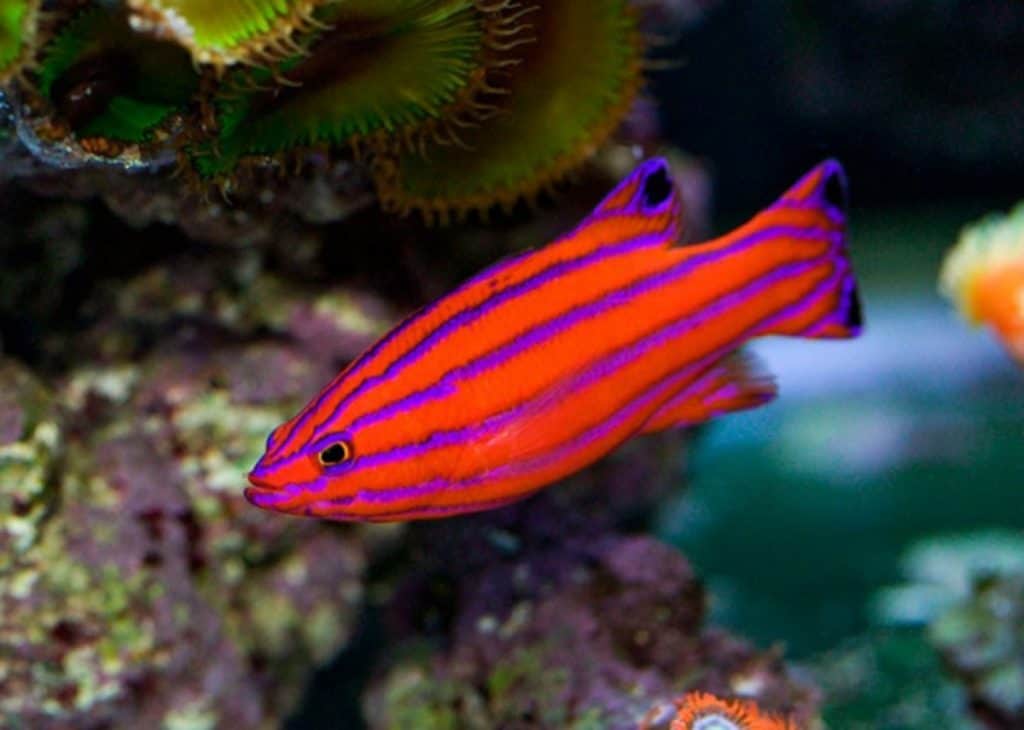 Candy Basslets Fetch $1000 upwards when offered for sale. Image Credit @plugon.us
Candy Basslets Fetch $1000 upwards when offered for sale. Image Credit @plugon.us
The Candy Basslet is part of the Serranidae family of sea basses, groupers and reef basslets. It’s one of only 23 species of subfamily Liopropomini.
These Fish are found in deep waters of the tropical Atlantic Ocean, ranging from the Florida Keys all the way to Carribean and as far north as South America.
What makes the Candy Basslet such an expensive saltwater fish? Well, they live in very deep waters and rarely swim above 25m. They prefer to live amongst deep coral reefs at around 100m. Now, try catching a 6cm fish at 100m in thick prickly corals! Not easy hey. Hence they fetch huge prices when caught.
10. Japanese Interruptus Angelfish $2000
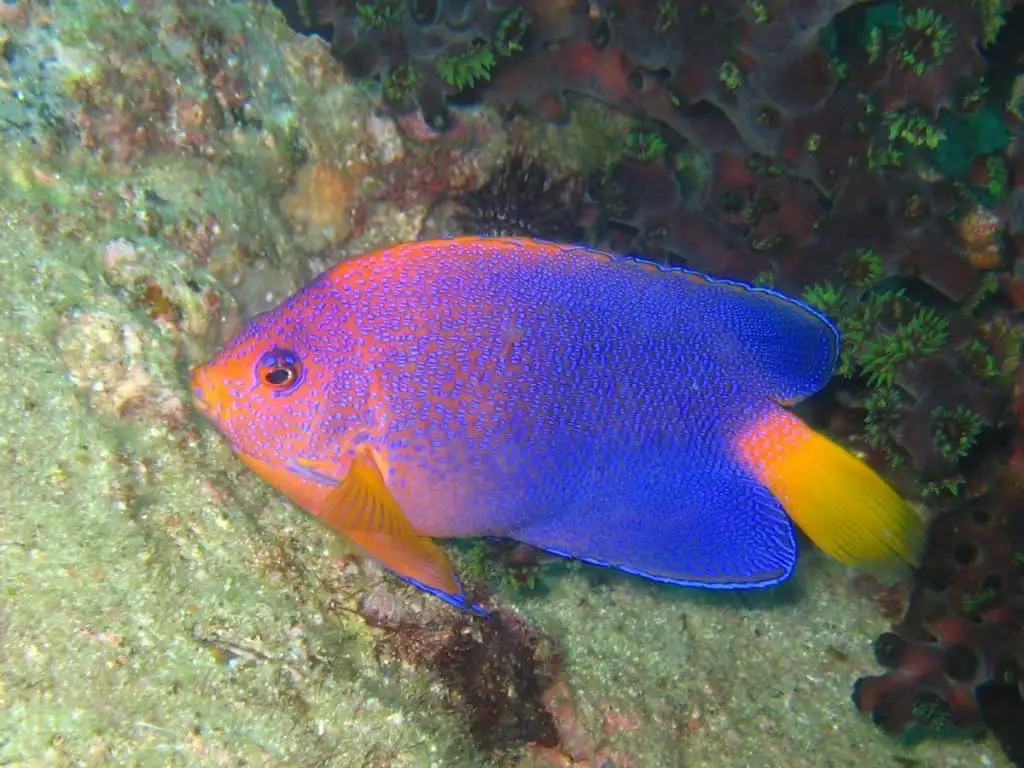 Japanese Interruptus Angelfish currently for sale priced $1999
Japanese Interruptus Angelfish currently for sale priced $1999
The Japanese Pygmy fish as it’s commonly known, comes from the waters around southern and central Japan and lives at depths of 15-65m.
They live in rocks and coral reefs and are often caught in the Hawaiian Islands. This small Angelfish is rarely seen for sale and can fetch good money when it does. We managed to track one down for sale at Marineworldaquatics.com – a snip at $199.
The suitable size for a home aquarium plus the amazing colors makes these fish attractive and a must have fish on anyone’s dream fish list. It has been on my fish bucket list for years now. But I still haven’t won the Lotto to buy one yet.
9. Clarion Angelfish $2500-$3000
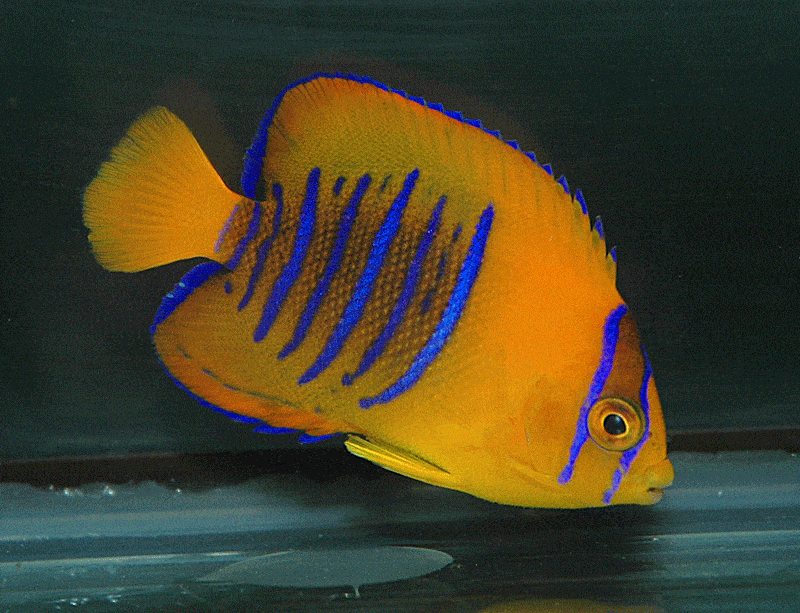 Juvenile Clarion Angelfish Look Completely Different To Adult Fish
Juvenile Clarion Angelfish Look Completely Different To Adult Fish
Clarion Angelfish or Holacanthus clarionensis as it’s known in Latin, is one of the first fish to appear on our Most Expensive Saltwater Fish List to be classed as ‘ Vulnerable ‘ on the IUCN Red List of Threatened Species.
This is due partly to the changing environment in which they live and also the overfishing of this species for the aquatic trade. When these fish command such a high price, you can see why collectors do everything they can to capture them for the aquatic trade.
Living predominantly off the Pacific coast of Mexico at depths of around 5-30m, this fish is easier to catch than some of the other fish in our list and fetches a high price due to its rarity – not how hard they are to catch.
It has to be said that juveniles look strikingly different to adults and both command different prices. The last one we saw for sale was at Liveaquaria.com and their price was $2999
8. Wrought Iron Butterfly $3000+
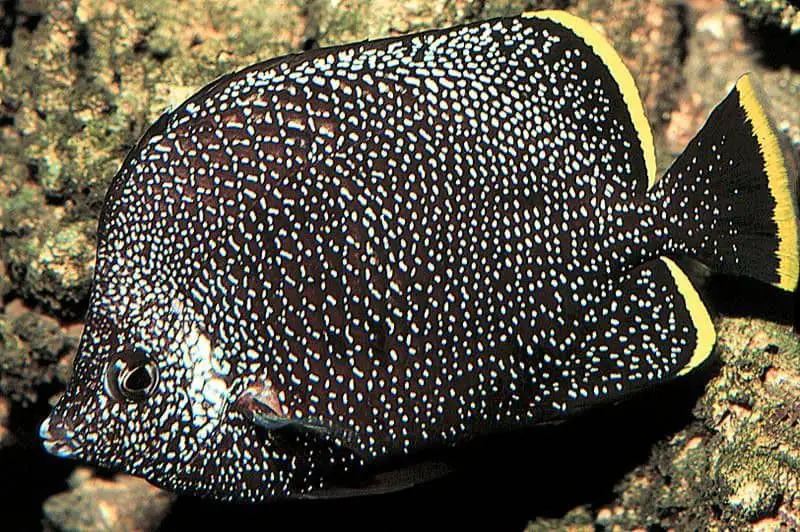 Wrought Iron Butterfly often command $3000+
Wrought Iron Butterfly often command $3000+
Wrought Iron Butterflyfish or Chaetodon daedalmahe, is native to the Western Pacific ocean near central and southern Japan. They can grow up to 6 inches long, which makes them a good size for the home aquarium. However, they will still require a tank of no less than 150-180 Gallons.
These fish are not on the Red Endangered species list but still command a high price. One was recently on display at a local aquarium show, where it was rumored to have been purchased for $3000. If this is true, the buyer actually got a bargain as we have known collectors pay $5k for this fish.
The Wrought Iron Butterflyfish rarely come up for sale in the US and are normally snapped up by collectors in the far east.
We last saw one for sale at Bluezooaquatics.com for $4199
7. Neptune Grouper $5000-$7000
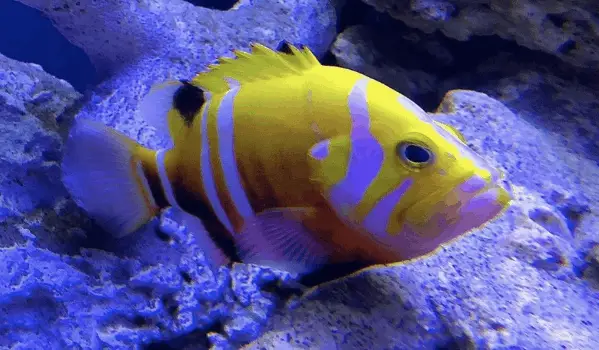 The very Rare Neptune Grouper Image Credits @Ron DeCloux
The very Rare Neptune Grouper Image Credits @Ron DeCloux
You are more likely to see this fish on ice at a food market than you are in a home aquarium. The Neptune Grouper fish live at incredible depths of around 100m, which makes catching live species almost impossible.
Catching a live species would require special decompression transportation, which means that the rare ones which have been caught can cost upwards of $7k. I have personally never seen one on sale but I have seen ones for sale in a fish market for $100.
Adult neptune Groupers display a pink coloration with yellow stripes, while the juvenile fish feature brilliant shades of orange and yellow.
6. Golden Basslet $7000-$8000
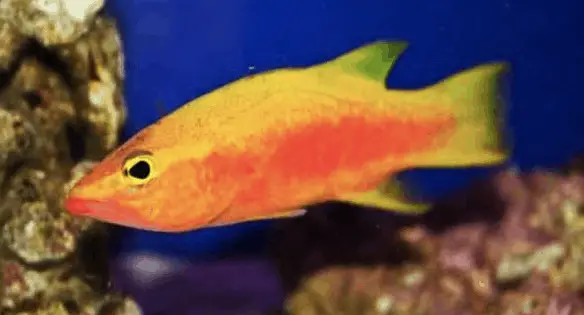 Stunning little fish with a hefty price tag
Stunning little fish with a hefty price tag
These fish are another species that is simply too hard to catch, which makes them extremely rare in the aquatic trade. The Golden Basslet (Liopropoma Aberrans) are one of the shyest fish I know; living at depths of around 50-80m as well as being shy, makes them one hard fish to catch.
They get their name from their striking colors and if captured, are amazingly interesting fish to watch in a home aquarium.
Rarley seen for sale, if you ever get the chance to see one, we suggest you jump at it, because at $8000 each, you’ll probably never own one.
5. Australian Flathead Perch $7500-$8000
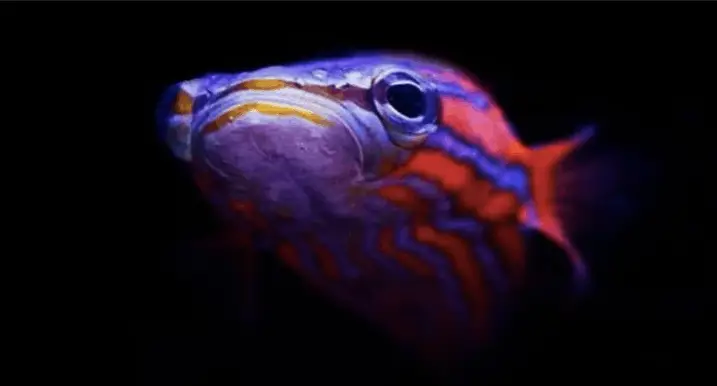 Australian Flathead Perch are Expensive!
Australian Flathead Perch are Expensive!
You will be hard pressed to find one of these for sale in any aquarium store. Only very limited numbers of specialist aquatic stores have ever seen, let alone sold one.
The average cost of the Australin Flathead Perch is $6-$8k. WOW!
So, why are they so expensive? The flathead perch (Rainfordia opercularis) comes from a small area within the reefs of eastern Australia. Their limited population and geographical range make this fish very rare indeed.
If you are lucky enough to own one of these fish, you’ll need an aquarium of around 150 Gallons plus perfect water conditions. They are reported to grow to around 6-7? and live for 5-7 years however, these are just guestimates as no one has kept one of these fish in one aquarium for their entire life. So, we are just guessing on the data to a certain extent.
4. Bladefin Basslet $8000+
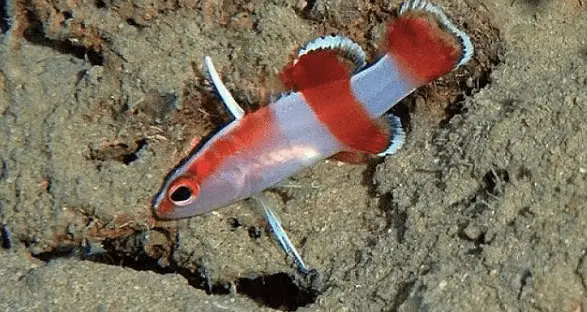 Extremely rare Bladefin Basslet
Extremely rare Bladefin Basslet
This tiny little fish command such a huge price tag of around $8000. The Bladefin basslet (Jeboehlkia gladifer) is one of the rarest saltwater fish known to have ever been caught and sold to a collector.
These fish live at incredible depths of over 150m, making them almost impossible to catch. On the rare occasions that they have been caught, they have often died in transit, making the ones that do survive the journey very valuable indeed.
With their stand-out feature being the blade-like fins and the striking color patterns, they are hard to mistake from any other fish that you’ll see in an aquarium store. However, we don’t think you’ll see one very often. We have not had the chance to witness this little beauty in person ourselves – but would like to get the chance. Would we spend $8000 on one? Well, just ask my wife to find out the answer to that one.
3. PeaceKeeper Maroon Clownfish $8900
Originally posted on YouTube by
Reef Builders
Okay, if I were ever to fork out a huge sum of money on one fish, then this might just be the one. I’m a sucker for beautiful clownfish and these are just incredible.
Costing around $8000 – $9000 they are not cheap!
These captive-bred species are very limited in numbers at the moment and only a few pair of breeding species exist.
The Peace Keeper Maroon Clownfish is a stunning new strain of Premnas biaculeatus from an ornamental fish-breeding company based in Israel.
From the thousands of young, these few pair produce only a few fish which show these amazing colors. Hence their rarity and price tag. If you want one, you’ll need to get your name on the waiting list and shell out at least $9K.
2. Masked Angelfish $15,000-$20,000
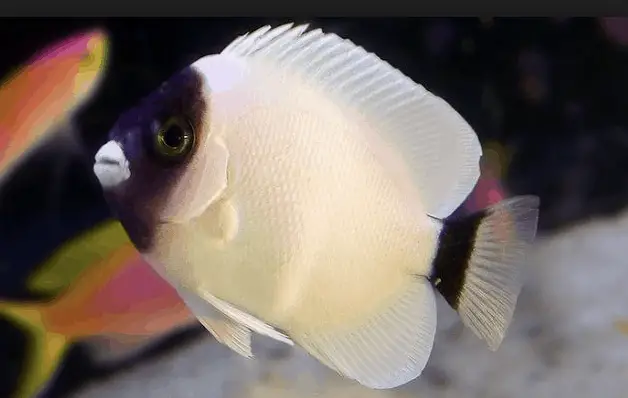 The Incredible Masked Angelfish price tag $20k
The Incredible Masked Angelfish price tag $20k
The Masked Angelfish from Hawaii is one of the most incredible fish to ever grace an aquarium. The majestic white body with striking offset black and blue simply looks amazing.
Surprisingly these fish are not on the endangered species list and are listed as ‘LEAST CONCERNED’ which means there’s no immediate danger of this fish becoming extinct. So, why so expensive I hear you say.
It’s scientific name is Genicanthus personatus and they live at very deep depths of 150m-175m which makes them incredibly hard to catch. They don’t travel very well and need specialist equipment to acclimatize them to lower depths and aquarium life. This process is not cheap and very few species survive – making them very rare indeed.
They can be found just off the Northwestern Hawaiian Islands, at the very edge of conventional diving limits, making these fish almost impossible to catch.
The number 1 most expensive saltwater fish is…..
1. Peppermint Angelfish $30,000
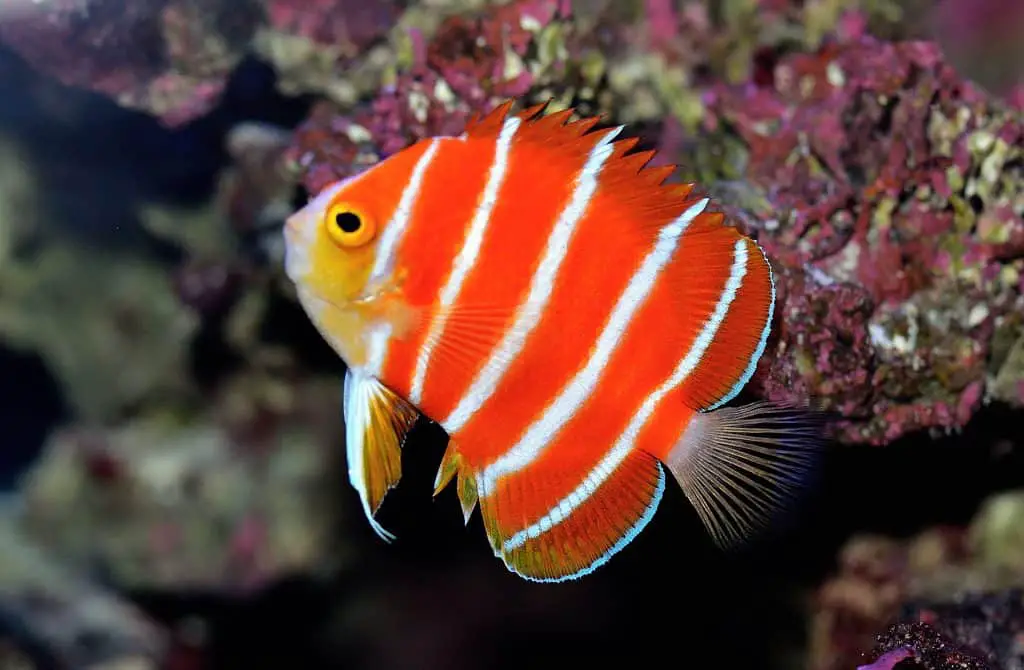 The most expensive saltwater fish ever sold, Peppermint Angelfish Image Credits @Reefbuilders.com
The most expensive saltwater fish ever sold, Peppermint Angelfish Image Credits @Reefbuilders.com
The Peppermint Angelfish inhabits tropical reefs in the eastern-central Pacific around the Cook Islands and Rarotonga and only reaches around 3?.
Let’s do the math, $10,000 per inch. WOW Now, that’s expensive.
It is a relatively shy fish, as it often hides among rocks and reef cliffs. Also known as Centropyge boylei, it lives at depths between 100-120m. With a bright orange body complemented by beautiful, clean white stripes, it’s not hard to see why anyone would want to own one.
However, we think these fish have risen in price through collectors hyping them up. Yes, they are incredibly rare but are they worth $30k? We’ll leave that up to you to decide. The Peppermint Angelfish is the most expensive saltwater fish you’ll come across.
Originally posted on YouTube by HONOLULUMagazine
Conclusion: The worlds most expensive saltwater fish
So if you have a spare $30,000 you can buy a Peppermint Angelfish or buy a new car whichever you prefer.
To answer most peoples question: Why are these saltwater fish so expensive?
It’s comes down to 3 or 4 reasons:
- Are they on the endangered species list
- How deep they live in the wild
- How hard they are to catch
- How well they travel and acclimatize to aquarium life
Then you could say they’re all hype! People and publications will help push the price up. There are always those who will always want what other people can’t have. That’s human nature and if money is no object, why shouldn’t you spend your hard earned money on something you love.
A lot of people wouldn’t think twice about spending $100k on a sports car so, why not $30k on something you will get just as much pleasure from – even if it won’t get you to work and back.
Information contained on this page is provided by an independent third-party content provider. Frankly and this Site make no warranties or representations in connection therewith. If you are affiliated with this page and would like it removed please contact pressreleases@franklymedia.com
More Like This
August 26th, 2019
November 13th, 2024
October 28th, 2024
October 17th, 2024
Top Headlines
December 26th, 2024
December 26th, 2024
December 26th, 2024
December 26th, 2024








